By Bahar Gidwani
part 2 of a 3-part series
In our last post, we described some of the new website and data features we are offering CSRHub’s subscribers for the more than 10,000 companies we track. However, we also added a new tool to our repertoire—CSRHub Dashboard. This tool allows our subscribers to download our ratings and data into an Excel spreadsheet template.
To make CSRHub Dashboard possible, we expanded our RESTful application program interface (API) to our database by adding hundreds of new “calls.” We then added a suite of functions into Excel (via a macro add in) that would allow our subscribers to use our interface to request the data they need.
Here are some examples of how our new Dashboard works:
- Competitive benchmarking. It is easy to pull in data on any number of companies (we’ve tested up to 10,000 names). Then, look at each company’s strengths and weaknesses at a top level or in detail.
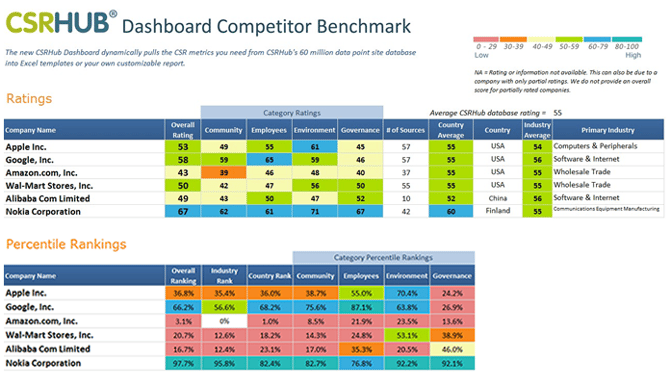
- Then, to understand “best practices,” you can drill down and see what systems companies use to report their performance or compare what each company reported for specific data elements from selected data sources.
- Company reporting. Want to know what others are saying about a particular company? You can quickly see how a company has been rated by any of our 365 sources.
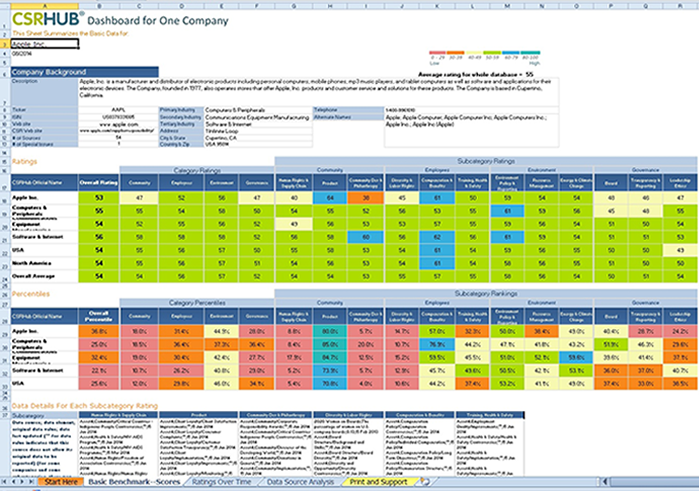
You can also look at how a company’s perceived performance has changed over time.
- Supply chain management. Load in the names of a company’s suppliers. Ask for the data you want to see. Press calculate and you should see ratings on most of the major suppliers. (CSRHub rates both public and private companies and is also rating an increasingly wide array of not for profit and government organizations.)
- Do it yourself. With more than 90 different functions available, our subscribers can build their own models and track and understand all types of sustainability ratings and metrics.
In keeping with our support for the broadest possible number of subscribers, we expect to soon introduce a Google Sheets version of the Dashboard. And, we plan to keep adding more functions (feel free to suggest them!). All of the new functions we added for our Dashboard users were also put into our RESTful API. This has made it easier for a wide range of developers to use our data in their applications and tools.
We found that supporting massive extractions of data was beginning to tax our infrastructure. So, we began migrating our web site from Drupal to RubyOnRails and we introduced a new MongoDB database to speed up access to our data. We still use Amazon servers—but added more “instances” to our system. Our average time to deliver a web page has decreased and we seem able to support many Dashboard users at any one time. We expect to keep moving forward on these technical fronts, as our member base continues to grow.
You’ve now heard “what” new features we’ve added to CSRHub. In the third post we’ll talk about “why” we are doing these things and where we are heading over the next year or so.
 Bahar Gidwani is CEO and Co-founder of CSRHub. He has built and run large technology-based businesses for many years. Bahar holds a CFA, worked on Wall Street with Kidder, Peabody, and with McKinsey & Co. Bahar has consulted to a number of major companies and currently serves on the board of several software and Web companies. He has an MBA from Harvard Business School and an undergraduate degree in physics and astronomy. Bahar is a member of the SASB Advisory Board. He plays bridge, races sailboats, and is based in New York City.
Bahar Gidwani is CEO and Co-founder of CSRHub. He has built and run large technology-based businesses for many years. Bahar holds a CFA, worked on Wall Street with Kidder, Peabody, and with McKinsey & Co. Bahar has consulted to a number of major companies and currently serves on the board of several software and Web companies. He has an MBA from Harvard Business School and an undergraduate degree in physics and astronomy. Bahar is a member of the SASB Advisory Board. He plays bridge, races sailboats, and is based in New York City.
CSRHub provides access to the world’s largest corporate social responsibility and sustainability ratings and information, covering on 10,000 companies from 135 industries in 104 countries. By aggregating and normalizing the information from 365 data sources, CSRHub has created a broad, consistent rating system and a searchable database that links millions of rating elements back to their source. Managers, researchers and activists use CSRHub to benchmark company performance, learn how stakeholders evaluate company CSR practices, and seek ways to improve corporate sustainability performance.
CSRHub is a B Corporation, an Organizational Stakeholder (OS) with the Global Reporting Initiative (GRI), a silver partner with CDP (Carbon Disclosure Project), and an Advisory Council Member of Sustainability Accounting Standards Board (SASB).
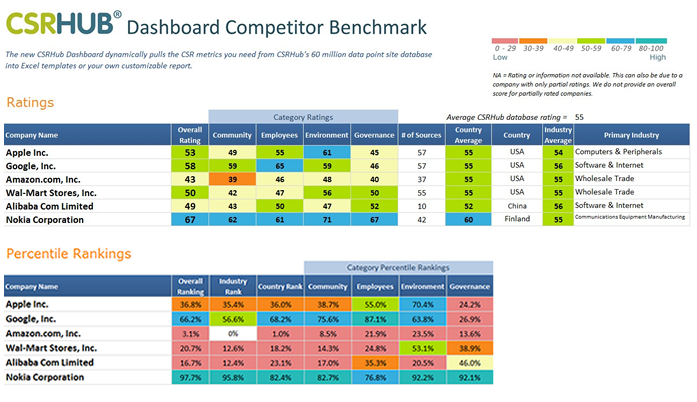
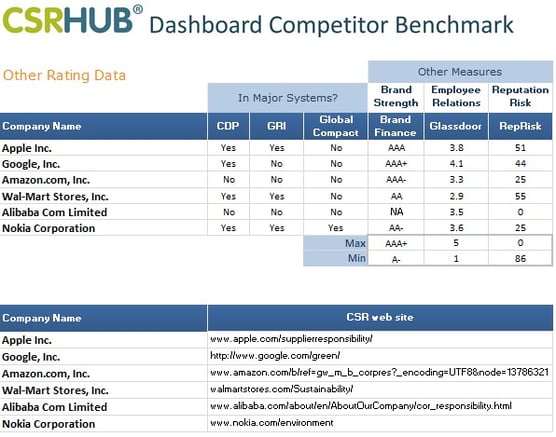

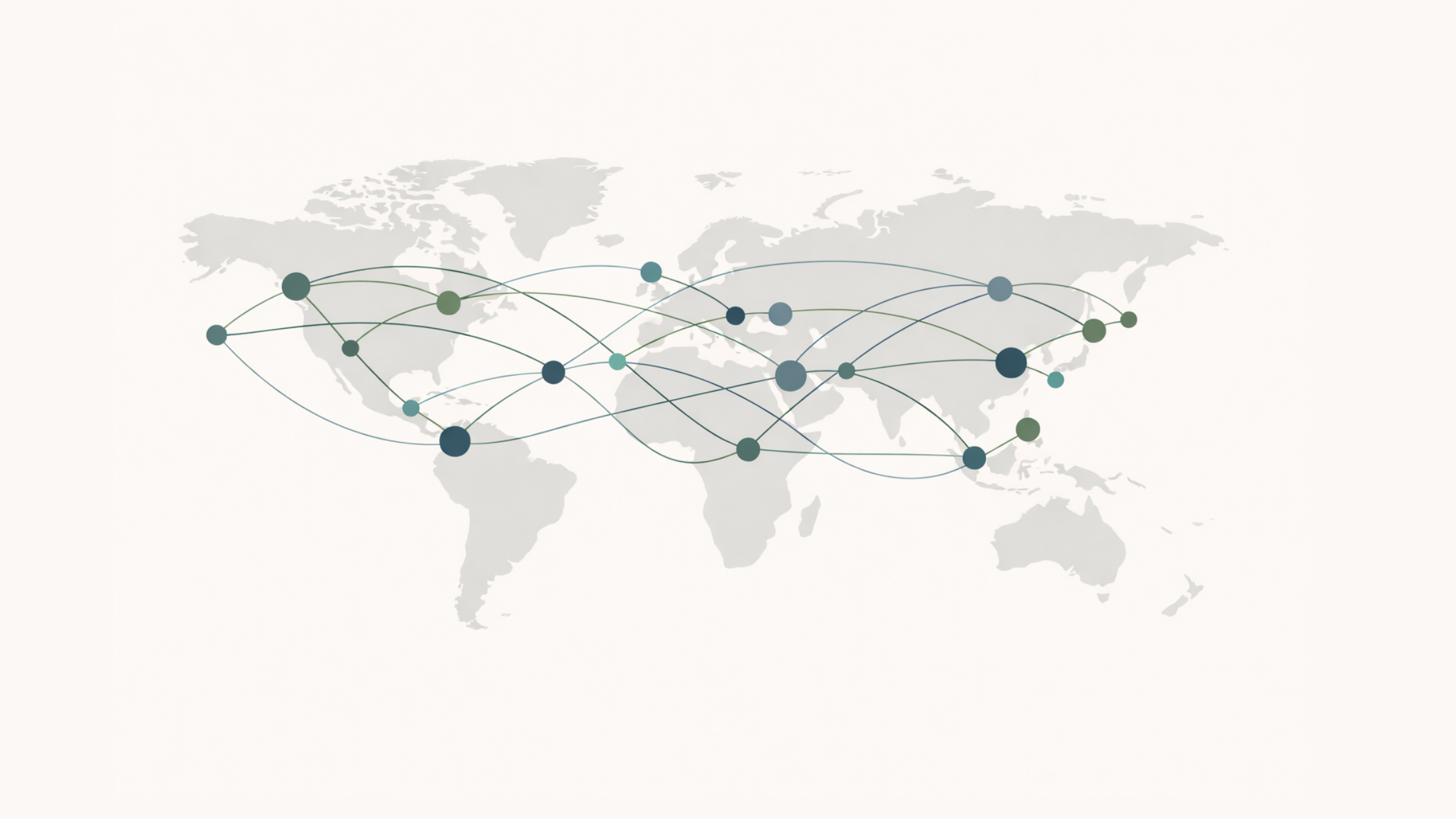
.png)
